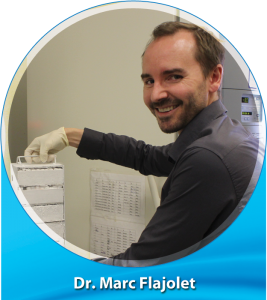October 18, 2012
 Please tell me about the research you’re currently doing in Dr. Greengard’s lab. What is the nature of the research? What are you targeting?
Please tell me about the research you’re currently doing in Dr. Greengard’s lab. What is the nature of the research? What are you targeting?
Dr. Marc Flajolet: I am a molecular biologist by training, working on brain signaling in the context of aging and Alzheimer’s disease (AD) especially, for over 12 years now. In Dr. Greengard’s lab, we use an elaborate set of state-of-the-art techniques (ranging from molecular biology to behavioral studies) to discover novel biological functions relevant for AD. Our interest is to identify novel cellular targets or pathways important for AD and study how those can be used to design new drugs that would be beneficial for AD. I also work on identifying novel small molecule compounds that affect AD models and cultured cells in ways that show a potential to treat the disease.
What results have you discovered thus far from your research, or what do you expect to find?
Dr. Marc Flajolet: We have discovered that Casein Kinase 1 (CK1) might represent an interesting target. Inhibition of CK1 could lead to improvement in two major hallmarks of AD: reduction in beta amyloid production and reduction in Tau phosphorylation. We are currently working to establish the CK1 mechanism and we hope to bring to light the cellular target of CK1 that leads to these effects.
Along those lines we have recently shown that a small compound (SMER28) could be beneficial for AD via its role in autophagy activation. We hope to further develop this family of compounds and optimize their brain permeability in order to test their efficacy in vivo.

What impact might your work have on Alzheimer’s diagnosis or treatment in the future?
Dr. Marc Flajolet: Our role most likely will impact the treatment much more that the diagnosis, but it is also possible that the genes we identify (such as the ones encoding proteins that interact with GSAP) could become important markers for the diagnosis of AD.
Any of the small molecule compounds that we identify has the capacity to become a drug to treat AD and therefore we put a lot of effort in this direction. We are working in a unique scientific environment that allows us to have access to a novel combination of techniques. This should help us tremendously to stay competitive and work at the highest possible pace.
What directions can you see your work taking in the future?
Dr. Marc Flajolet: We hope and believe that we will be able to move away from simple systems such as cellular tests and go forward toward more complex systems, and ideally bring some of our discoveries into pre-clinical studies and clinical trials.











